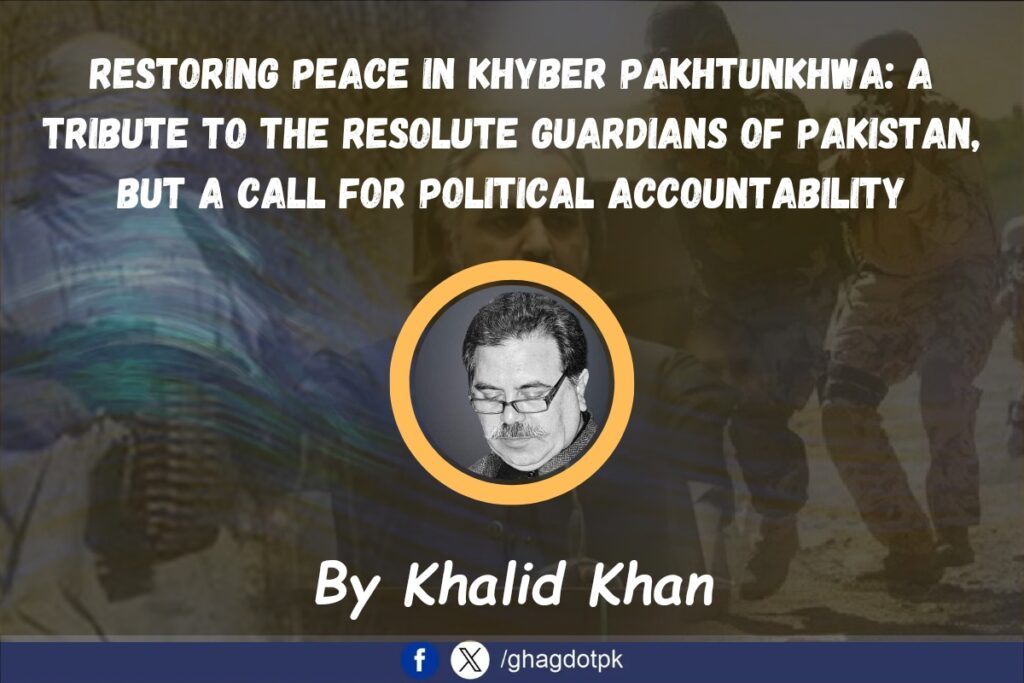By Khalid Khan
Khyber Pakhtunkhwa (KP), once a region ravaged by the scourge of terrorism, has seen considerable peace restored, thanks to the unmatched dedication and sacrifices of Pakistan’s armed forces. However, as the region struggles with a renewed wave of terrorist activity, one key issue remains clear: while the military’s efforts have been instrumental in restoring order, the ultimate responsibility for maintaining peace lies with the provincial government. The PTI-led provincial government, under Chief Minister Sardar Ali Amin Gandapur, has displayed alarming indifference, allowing terrorist attacks to surge once again.
The Military’s Role: A Triumph of Strategy and Sacrifice
KP, between 2005 and 2022, accounted for nearly 40% of Pakistan’s terrorist attacks. Over 6,000 lives were lost, and terrorist incidents surged to an average of 450 per year during the height of the insurgency. However, the tide began to turn with the launch of Operation Zarb-e-Azb (2014) and Operation Radd-ul-Fasaad (2017).
Militant Neutralization: Over 3,400 militants were neutralized, and thousands of weapons were seized, dismantling the operational capacity of many terrorist groups in the region.
Security Improvements: Between 2015 and 2021, KP saw a 60% drop in terrorist-related fatalities, a testament to the effectiveness of military operations in restoring stability.
Terrorist Attacks Declined by 70%: Following military operations, KP saw a substantial decline in the number of attacks, from bombings to targeted assassinations, thanks to the army’s relentless operations.
A New Surge in Terrorism: KP Faces Resurgence
While the military succeeded in restoring order, the provincial government’s failure to establish effective governance has allowed terrorism to resurface. Areas like Dera Ismail Khan, Bannu, Lakki Marwat, South and North Waziristan, Peshawar, and Mardan have once again become hotbeds of militant activity.
Rising Terrorism: A 40% rise in terrorist attacks was reported in KP between 2022 and 2023, with high-profile incidents, including bombings, targeted killings, and assaults on law enforcement agencies.
Geographic Spread: Areas such as Peshawar and Mardan, once seen as relatively safe, have become regular targets of militant violence. In South Waziristan, terrorist groups have regained ground, exploiting the political vacuum and lack of effective governance.
The PTI Government: A Picture of Inaction
Despite the military’s success in combatting terrorism, the PTI-led provincial government under Chief Minister Sardar Ali Amin Gandapur has failed to act decisively.
Indifference to Counterterrorism: The PTI government’s indifference is evident in the lack of coordination with the military and inadequate counterterrorism measures. Despite the surge in attacks, the provincial government has been slow to respond, allowing terrorist groups to regain ground.
Weak Law Enforcement: The provincial police remain ill-equipped, undertrained, and poorly funded, rendering them ineffective in countering the growing militancy.
Inaction in Reform: While military operations have focused on neutralizing terrorist groups, the provincial government has neglected reforms necessary for long-term peace, such as enhancing the capacity of law enforcement and integrating security agencies into a cohesive strategy.
The Responsibility of Governance: A Call for Action
It is increasingly clear that the responsibility for sustaining peace lies not with the military alone but with the provincial government. While the army’s sacrifices have broken the backbone of militant groups, the ongoing violence underscores the failure of the PTI government to establish effective governance and law enforcement in KP.
Increased Militancy Due to Poor Governance: The absence of strong governance and counterterrorism policies has allowed militant groups to thrive, making areas like Bannu, Lakki Marwat, and North Waziristan breeding grounds for terrorism.
Political Apathy: The PTI government’s failure to enact proactive measures, such as increasing the budget for law enforcement and reforming intelligence agencies, has left the people of KP vulnerable once again.
Conclusion: A Future That Demands Political Will
The battle for peace in KP is far from over. While the military has proven its ability to restore order, the provincial government must take responsibility for sustaining that peace. The indifference of the PTI-led administration, under Chief Minister Sardar Ali Amin Gandapur, is putting the region at risk of sliding back into the chaos that it so painfully endured. If the PTI government continues to shirk its duties, the hard-won peace achieved through military efforts could be in jeopardy. The time for action is now—governance is not about slogans, it’s about protecting the people.






